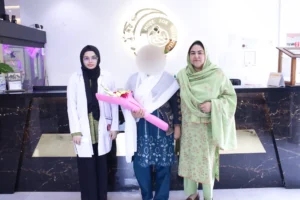The decision to kickstart the IVF treatment process is not easy. There’s a wealth of information about fertility treatments out there. With so much to learn and explore, it’s normal to wonder what IVF treatment is and how long IVF takes from the first appointment.
If you are a part of online forums and communities where IVF and other fertility procedures are discussed openly, you must already know that the pregnancy journey for every couple who opts for fertility treatment is unique.
Some complete it in 4-6 weeks, while for others, it may take longer. In this post, we’ve listed the typical IVF treatment time and the factors that can cause delays. Let’s get started.
Why IVF Treatment Timeline Matters: Emotional & Practical Preparations
Timeline matters. Understanding the clear breakdown of the procedures in IVF will not only give you peace of mind, but it will make it easier to plan travel, work, and other commitments. The procedure is lengthy.
It starts with hormonal medication and ends with embryo transfer. Even after that, you will be on progesterone supplements that prepare your womb for the biggest step—implantation.
- Prepare Mentally: Continuous hormonal injections with trigger shots and surgical procedures can all take a toll on your mental and physical health. Knowing these processes in advance will at least give you enough time to prepare mentally for what’s coming.
- Commitments: Certain procedures, like egg retrieval, require you to visit the clinic at specific times. It’s important to be informed about such steps beforehand so that you don’t plan work or travel around this time.
- Holidays: Lahore’s fertility clinics are pretty crowded after Ramadan, Eid, and holidays. Scheduling your treatment according to these dates can speed up your treatment, as there will be comparatively fewer patients.
How IVF Timelines May Vary
There’s no fixed or one-size-fits-all IVF calendar. The journey of two couples walking into the IVF clinic at the same time may be totally different, depending on their fertility cause, age, and other factors.
- Maternal Age: The mother’s age has a great impact on the IVF timeline. Younger women respond better to ovarian induction medication. They might be prepared for egg retrieval earlier than older women, who may require multiple dosage modifications.
- Fertility Diagnosis: For women with medical issues, such as PCOS, a Lahore fertility specialist may use a gentler ovarian induction protocol to reduce the risk of ovarian hyperstimulation syndrome. If your infertility is due to fibroids, removal of the fibroid that could interfere with implantation may be needed before starting fertility treatment.
- Response to Medication: Some women may be ready for egg retrieval within 10 days of hormonal injections, while others have a slow response. This can also shorten or lengthen your IVF cycle.
Typical IVF Treatment Timeline
Let’s understand the phases of IVF and how much time they take:
Consultation
In the initial consultation, your fertility specialist will conduct physical tests and run other basic fertility tests, such as blood tests, hormone tests, ultrasounds, and even hysteroscopy if needed.
Hormone Injections
Injections containing FSH and LH are administered for 8-14 days (daily) to prepare your eggs for retrieval. Some women may respond early, i.e., they are ready for egg retrieval in as little as 8 days.
Egg collection
It’s a one-day, outpatient, minimally invasive surgical procedure, in which your prepared eggs are aspirated using a fine needle. Egg retrieval is done within 38 hours of the trigger shot (the final shot that matures the egg).
Embryo Transfer
Once the eggs are collected and fertilized, they are stored in an incubator for 3-5 days. As soon as they reach the blastocyst stage, they are transferred to your uterus.
Pregnancy Test
IVF ends here. You need to wait for 2 weeks to take a pregnancy test. You can do it at home or visit your fertility clinic for a blood test.
Overall, the procedure finishes between 4 and 6 weeks. For some couples, IVF can be a 2-3 month journey. If a woman needs a rest cycle to prepare her womb for implantation, the timeline is extended.
Support Systems During IVF in Lahore
There’s a reason why couples who’ve been through fertility treatments say that IVF is emotionally draining. The procedure doesn’t just require a skilled medical team, but also a strong support system.
Many clinics have psychologists or mental health support groups that offer professional support to patients throughout their IVF cycle. They explain each procedure, listen to their patients, and provide tips for keeping calm. Experts believe that patients who don’t experience stress during IVF enjoy a smoother fertility treatment and might even have a better outcome.
Additionally, you need support from your partner and loved ones. Your family and friends, for example, can help with household chores, while your partner can accompany you to your visits for consultations, injections, ultrasounds, retrieval, and other procedures. It builds emotional resilience, which encourages you to go through the IVF cycle feeling calm and composed.
Does Your Choice of Fertility Clinic Affect Timeline?
Your choice of fertility center matters a lot when it comes to the IVF treatment timeframe. Lahore has many modern fertility centers that use innovative technology to increase the success rate. But that’s not enough.
You need to consider other factors to ensure a positive outcome, a seamless experience, and an overall smooth journey.
Reputation: Always choose a reputable clinic with a proven track record. Check the experience they hold, the number of patients they have served, the number of satisfied clients, and other such details. These metrics tell a lot about the clinic’s reputation.
IVF Team: When evaluating IVF clinics in Lahore, go over the details of their medical staff. Embryologists and fertility specialists who have handled hundreds of IVF cycles can manage your case efficiently.
Communication: Look for a clinic that offers on-demand support and regular communication through email, WhatsApp, and phone. If your team doesn’t communicate well, your IVF cycle might be delayed.
Quality of the Lab: Another important consideration is the quality of the embryology lab. Look for a clinic featuring an embryologist and a lab with state-of-the-art technology.
From Transfer to Pregnancy Test: The Most Anxious Wait
Once you are done with the final step of IVF (embryo transfer), you will enter a 2-week waiting period. This is when you are given instructions regarding how to de-stress your mind, eat right, exercise well, meditate, and seek emotional support if needed.
This short waiting period might feel the longest, as couples often report anxiety, stress, fear, and other such emotions. Let’s first take a look at what exactly happens during this time.
The embryo that’s transferred to the uterus will either attach itself to your womb or not. Unfortunately, there’s no sure way to tell whether you are pregnant until the day you take a pregnancy test. Your fertility specialist may prescribe progesterone to thicken your uterine lining and prepare it for implantation.
Tips for Making the Wait Easier
The feelings of confusion, anxiety, and hope are absolutely normal around this time. Since you are almost done with the major IVF steps and might not have much to do, your mind will be occupied with plenty of emotions. Here’s how to cope with this:
Stay Active: Unless you are advised otherwise, stay active—practice stretching, light exercises, walking, and other physical activities.
Do Not Take Pregnancy Test Too Early: While you may feel tempted to take the pregnancy test already, wait until two weeks after embryo transfer for accurate results.
Eat Right: This is the best time to eat nourishing foods and take vital supplements, like folic acid, calcium, and iron.
Avoid Google Searches: Instead of searching for your symptoms on Google, call your fertility specialist. They will be able to guide you better.
Conclusion
The 4-6 week IVF treatment time frame is just an average time. There is no fixed time limit. In fact, IVF is a flexible fertility journey that can adapt to your individual requirements and health goals. Trust your Lahore-based fertility experts with IVF. Never compare your journey with that of others. You should rather be patient, stay connected with your doctors, and seek professional support for your emotional health when needed.
FAQS
- Does IVF work 100% of the time?
No, IVF doesn’t work for every couple. Some get pregnant on the first try. For others, it may take multiple cycles. Unfortunately, for some, the treatment doesn’t work at all.
- How many days after IVF is pregnancy confirmed?
You need to wait two weeks after IVF to test for pregnancy.
- What is considered Day 1 of your period in IVF?
Day 1 of your period is the day when menstrual bleeding starts.
- How many rounds of IVF are normal?
There’s no specific number of cycles that are considered normal in IVF. Young women conceive in fewer cycles, while older women might require 3-6 and even more cycles.
- How long does it take to get pregnant through IVF?
If your IVF is successful, it may take 4-6 weeks for you to get pregnant. The journey starts with ovarian stimulation and ends with embryo transfer.
- How many weeks pregnant are you after a successful IVF transfer?
Doctors calculate pregnancy using the last menstrual period in natural conception. The same rule applies to IVF. You are considered 2 weeks pregnant around your embryo transfer day. Let’s say the doctors transferred the embryo on the 5th day of embryo culture. So, you will be 2 weeks + 5 days pregnant already.






